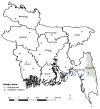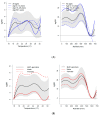Disparities in Risks of Malaria Associated with Climatic Variability among Women, Children and Elderly in the Chittagong Hill Tracts of Bangladesh
- PMID: 33348771
- PMCID: PMC7766360
- DOI: 10.3390/ijerph17249469
Disparities in Risks of Malaria Associated with Climatic Variability among Women, Children and Elderly in the Chittagong Hill Tracts of Bangladesh
Abstract
Malaria occurrence in the Chittagong Hill Tracts in Bangladesh varies by season and year, but this pattern is not well characterized. The role of environmental conditions on the occurrence of this vector-borne parasitic disease in the region is not fully understood. We extracted information on malaria patients recorded in the Upazila (sub-district) Health Complex patient registers of Rajasthali in Rangamati district of Bangladesh from February 2000 to November 2009. Weather data for the study area and period were obtained from the Bangladesh Meteorological Department. Non-linear and delayed effects of meteorological drivers, including temperature, relative humidity, and rainfall on the incidence of malaria, were investigated. We observed significant positive association between temperature and rainfall and malaria occurrence, revealing two peaks at 19 °C (logarithms of relative risks (logRR) = 4.3, 95% CI: 1.1-7.5) and 24.5 °C (logRR = 4.7, 95% CI: 1.8-7.6) for temperature and at 86 mm (logRR = 19.5, 95% CI: 11.7-27.3) and 284 mm (logRR = 17.6, 95% CI: 9.9-25.2) for rainfall. In sub-group analysis, women were at a much higher risk of developing malaria at increased temperatures. People over 50 years and children under 15 years were more susceptible to malaria at increased rainfall. The observed associations have policy implications. Further research is needed to expand these findings and direct resources to the vulnerable populations for malaria prevention and control in the Chittagong Hill Tracts of Bangladesh and the region with similar settings.
Keywords: Bangladesh; Chittagong Hill Tracts; climatic variability; malaria; vulnerable groups.
Conflict of interest statement
The authors declare no conflict of interest.
Figures




Similar articles
-
The role of climate variability in the spread of malaria in Bangladeshi highlands.PLoS One. 2010 Dec 16;5(12):e14341. doi: 10.1371/journal.pone.0014341. PLoS One. 2010. PMID: 21179555 Free PMC article.
-
Temporal trends in severe malaria in Chittagong, Bangladesh.Malar J. 2012 Sep 12;11:323. doi: 10.1186/1475-2875-11-323. Malar J. 2012. PMID: 22970881 Free PMC article.
-
Malaria hotspots drive hypoendemic transmission in the Chittagong Hill Districts of Bangladesh.PLoS One. 2013 Aug 6;8(8):e69713. doi: 10.1371/journal.pone.0069713. Print 2013. PLoS One. 2013. PMID: 23936345 Free PMC article.
-
Bangladesh in the era of malaria elimination.Trends Parasitol. 2023 Sep;39(9):760-773. doi: 10.1016/j.pt.2023.06.009. Epub 2023 Jul 25. Trends Parasitol. 2023. PMID: 37500334 Review.
-
Bangladesh should engage the private sector for malaria elimination by 2030.Lancet Reg Health Southeast Asia. 2024 Sep 27;31:100487. doi: 10.1016/j.lansea.2024.100487. eCollection 2024 Dec. Lancet Reg Health Southeast Asia. 2024. PMID: 39399862 Free PMC article. Review.
Cited by
-
Climate variability, socio-economic conditions and vulnerability to malaria infections in Mozambique 2016-2018: a spatial temporal analysis.Front Public Health. 2023 Jun 1;11:1162535. doi: 10.3389/fpubh.2023.1162535. eCollection 2023. Front Public Health. 2023. PMID: 37325319 Free PMC article.
-
Mapping climate change interaction with human health through DPSIR framework: Qatar perspective.Heliyon. 2025 Feb 4;11(3):e42455. doi: 10.1016/j.heliyon.2025.e42455. eCollection 2025 Feb 15. Heliyon. 2025. PMID: 40007788 Free PMC article. Review.
-
Understanding climate-sensitive diseases in Bangladesh using systematic review and government data repository.PLoS One. 2025 Mar 19;20(3):e0313031. doi: 10.1371/journal.pone.0313031. eCollection 2025. PLoS One. 2025. PMID: 40106483 Free PMC article.
References
-
- Haque U., Overgaard H.J., Clements A.C.A., Norris D.E., Islam N., Karim J., Roy S., Haque W., Kabir M., Smith D.L., et al. Malaria burden and control in Bangladesh and prospects for elimination: An epidemiological and economic assessment. Lancet Glob. Health. 2014;2:e98–e105. doi: 10.1016/S2214-109X(13)70176-1. - DOI - PubMed
-
- Rahman A. Climate change and its impact on health in Bangladesh. Reg. Health Forum. 2008;12:16–26.
Publication types
MeSH terms
LinkOut - more resources
Full Text Sources
Medical

